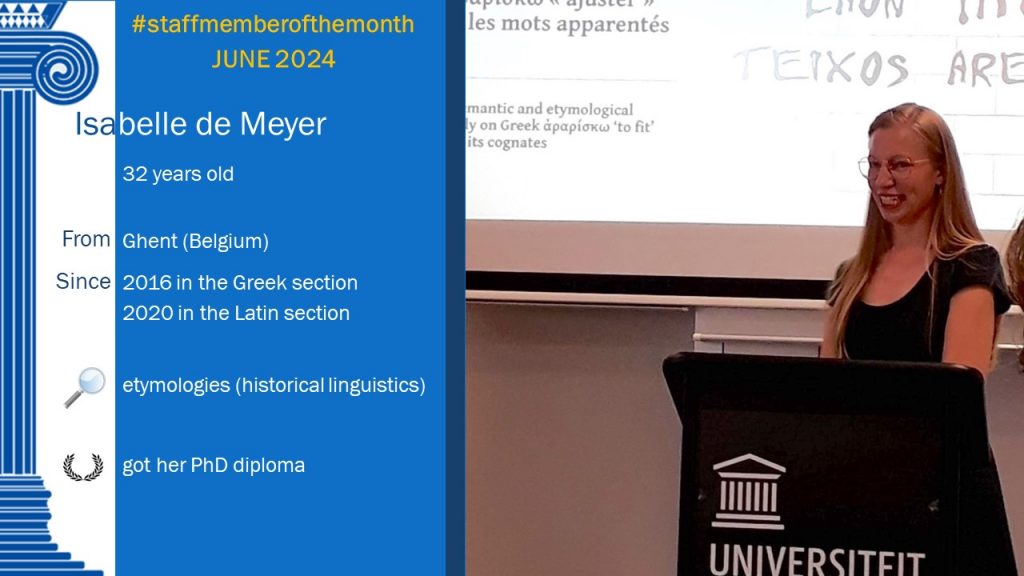The staff member of this month is Isabelle de Meyer, who successfully defended her joint PhD thesis in Historical Linguistics (Ghent University – Ecole Pratique des Hautes Études) a few weeks ago! Yasmine Amory took this perfect occasion to take a journey with Isabelle on ancient etymologies, and much more.

Hi Isabelle! First of all, my biggest congratulations on a great personal and professional achievement: your recent PhD defense! How do you feel these days? Is the adrenaline still on?
Thank you so much! The days after my defence were, erhmm, well, let me explain it this way: after having motivated myself for months by thinking of Dory, the fish from the Disney movie Finding Nemo, singing “just keep swimming, swimming”, I suddenly felt like the fish at the end of the same movie when they finally reach the ocean and say: “now what?”. But I am starting slowly to find a new routine and the adrenaline has been replaced by enjoyment, which is great.
You are probably the ‘panda’ of Greek linguistics at UGent, as it is nowadays more and more unique to devote a PhD thesis on the etymology of a Greek word. Could you tell us more about your topic? And are there any research results you’re especially proud of?
Héhé. Basically there are several Greek words (but also Latin, Dutch and others) starting with ar- (or har-, or ra-, or others that would also come from a sequence ar-) that can grosso modo be divided into two categories: words belonging to the semantic domain of craftmanship like ἀραρίσκω ‘to adjust, attach’, ἅρμα ‘wheel, chariot’, ἁρμός ‘bolt, dowel’, and ἁρμονία ‘tenon’, and words referring to the nonphysical moral/social domain like ἀρείων ‘better’, ἄριστος ‘best’, ἀρετή ‘excellence; skill’ and compounds like ἀρτίφρων ‘sound of mind; intellectual’. The question was whether the words of the second group are derived from the same root as those of the first group and as such show a metaphorical development from the technical domain to the moral domain (cf. ‘hoe maakt u het’ in Dutch) or not, and if yes, which one. Spoiler alert: yes! Via the development ‘be attached/fixed’ > ‘be firm-fixed’ (cf. Dutch ‘standvastig’) > ‘be firm, solid’ and thus of good quality (cf. English ‘a solid plan’). Proof for such a metaphor can be found, among others, in the fact that the verb ἀραρίσκω, the comparative and superlative adjective and ἀρετή play a fundamental role in the expression of one of the crucial themes of the Iliad, namely the importance of warriors standing firm like a wall, either to attack without withdrawing, or to protect and not letting the enemy through. As such there is a link between the warriors that are called ἄριστος ‘the most firm one’ and those that are compared to a wall, like Ajax the Great who is named ἕρκος Ἀχαιῶν ‘bulwark of the Greeks’. Cool, right? Pretty proud of that!
Basically there are several Greek words (but also Latin, Dutch and others) starting with ar- (or har-, or ra-, or others that would also come from a sequence ar-) that can grosso modo be divided into two categories: words belonging to the semantic domain of craftmanship (…) and words referring to the nonphysical moral/social domain (…). The question was whether the words of the second group are derived from the same root as those of the first group and as such show a metaphorical development from the technical domain to the moral domain.
Pretty cool indeed! Great – and solid – job! I remember that during your PhD you spent a research stay at the University of Cambridge to collaborate with renowned experts in Linguistics. How was it?
Indeed; since a crucial part of my research consisted of the interpretation of the generally overlooked/neglected Mycenaean Greek data I went to Cambridge to collaborate with the Mycenaean Epigraphy Group – a group of specialists in Linear B studies that was founded many decades ago by none else than John Chadwick. It was amazing to be surrounded by enthusiastic scholars that share your passion for ancient scripts – I learned a lot.
I’ve also heard that you recently spent a period in Wales after submitting the PhD – a great way to change perspectives! Did you enjoy it?
I looooved it! The people are very kind, the nature is just wonderful (beaches, hills, forests… all around), the Welsh cakes are delicious, and I am a very big fan of the concept of a sparkling high tea. Would definitely recommend and will definitely go back!
You’ve been a member of the Greek section for a long time, and you’ve been contributing to its growth with enthusiasm. I especially remember a video of you explaining the origin of the alphabets to pupils. What did you enjoy the most about outreach?
It was very pleasant to make that video – for which all credits should go to the talented Ilse De Vos who put it together – as it motivated her son and others to become acquainted with the Greek alphabet as well as with other writing systems. In a parallel universe where we both have more time we already made a whole series of such explicative videos for children. Maybe one day in the future.
In a parallel universe where we both have more time we already made a whole series of such explicative videos for children.
While we wait for it, it is time to look to the near future, now! Summer is finally here, do you have any plans?
My partner in crime, Olivier, and I are planning to go on a sporty holiday in France; although we haven’t decided yet whether we will go surfing in the ocean or rather camping in the mountains, I am already very much looking forward to enjoy some French cheese and wine in the sun!
Both options sound lovely! Enjoy a well-deserved holiday, Dr. de Meyer! And… keep swimming!